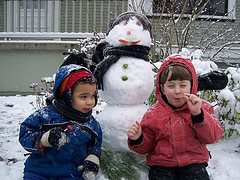The kids and I are preparing to go to a friend's party, where we'll be wrapping presents for less-fortunate children, like those spending Christmas in one of our local hospitals. Also knowing that the Salvation Army near us has said it's short on toys this year, I asked each of my kids to take stock of their toys or books and select a few in really good shape for us to donate. Choose five, I suggested—one for every new toy they hope to get for Christmas.
I thought this seemed like a nice holiday tradition for us to start, and I hoped they'd get the non-materialistic message. Molly, however, heard something else.

"WHAT!?" she screamed. "I'm only getting FIVE toys for Christmas?! I WANT MORE THAN THAT!" And then there were nearly tears.
Holy cow, you'd think that my kids would have escaped all the materialistic mayhem at this time of year, what with their preachy mother and zero exposure to toy advertising, as we don't get any TV stations and don't listen to radio Disney. Apparently not.
Paranoid that despite my best efforts I'm raising materialistic consumers, I decided to look into why some kids are so materialistic while others could care less about having all the latest stuff.
Turns out that there are two things that influence how materialistic kids are. The first is obvious: Consciously or not, we adults socialize kids to be materialistic. When parents—as well as peers and celebrities—model materialism, kids care more about wealth and luxury. So when parents are materialistic, kids are likely to follow suit. Same thing with television viewing: The more TV kids watch, the more likely they are to be materialistic.
The less obvious factor behind materialism has to do with the degree to which our needs are being filled. When people feel insecure or unfulfilled—because of poverty or because a basic psychological need like safety, competence, connectedness, or autonomy isn't being met—they often to try to quell their insecurity by striving for wealth and a lot of fancy stuff. Because of this, relatively poor teenagers ironically tend to be more materialistic than wealthy ones. And less nurturing and more emotionally cold mothers tend to have more materialistic offspring.
So materialism and the behaviors that go with it—desiring and buying brand name clothes and luxury items—can be symptoms of insecurity and a coping strategy used to alleviate feelings of self-doubt or bolster a poor self-image. But if what kids are really seeking is greater happiness and fulfillment, materialism is a terrible coping method. At best, it will only provide short-term relief; in the long-run it is likely to actually deepen feelings of insecurity.
One way to curb kids' materialism is to limit their exposure to advertising. Another way, it turns out, is to try to meet their emotional needs, not their material ones. On that front, the research I cover in this blog suggests some good places to start; practicing gratitude, for example, or by emotion coaching—even simply by eating dinner together.
Epilogue: After her initial complaints, Molly has really gotten into the Christmas spirit—especially after we stopped to think about what it might be like to be poor or in the hospital over the holidays. All she needed to do was to think about how she has the power to help other people and her mood improved dramatically—and her generous spirit has emerged.
© 2009 Christine Carter, Ph.D.
Selected references:
Goldberg, M.E., and Gorn, G.J., Perrachio, L.A., Bamossy, G., "Understanding Materialism among Youth", Journal of Consumer Psychology 13 (2003).
Kasser, T., The High Price of Materialism (Cambridge, MA: MIT Press, 2002).
Rose, P. and DeJesus, S.P., "A Model of Motivated Cognition to Account for the Link between Self-Monitoring and Materialism", Psychology & Marketing 24, no. 2 (2007).
Join the Campaign for 100,000 Happier Parents by signing this simple pledge.Become a fan of Raising Happiness on Facebook.
Follow Christine Carter on TwitterSubscribe to the Happiness Matters Podcast on iTunes.


Comments
My Mom had a fantastic tradition. Every August before school started, during the heat of a Texas summer, we would clean out our closets.
We would sort our games and those we hadn’t played with over summer would be checked. If all the parts were there they went into 1 of three boxes (Texas Children’s, MDA, and RMH. The same with books I had out grown. Clothes we had outgrown (sis and I were polar opposites so rarely did she get clothes that had been mine) were given to Catholic Charities.
Because Mom was a volunteer, we got to deliver and at RMH actually put up the toys and books.
One time I remember I kept taking one book out of the boxes and it kept ending up in the boxes. Finally I caught Mom putting it there. I told her under no circumstances would I give that book to those charities it was going to the church drive. The book was about a child who dies of cancer. Mom left the sorting of books to me after that.
Kimberly | 8:04 pm, December 17, 2009 | Link
love this one!!!
R.T. | 12:47 pm, December 30, 2009 | Link
i endorse ideas about materialistic kids.needs to try out.
Y.P. | 12:48 pm, December 30, 2009 | Link